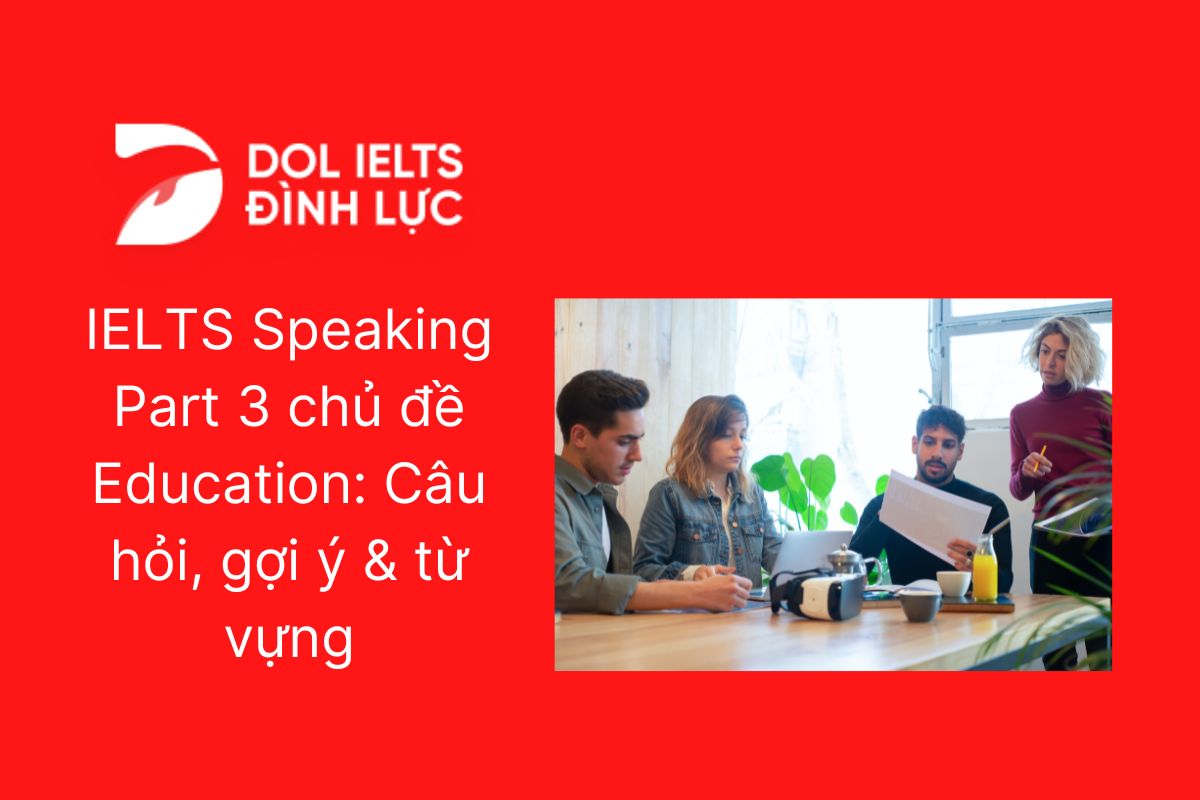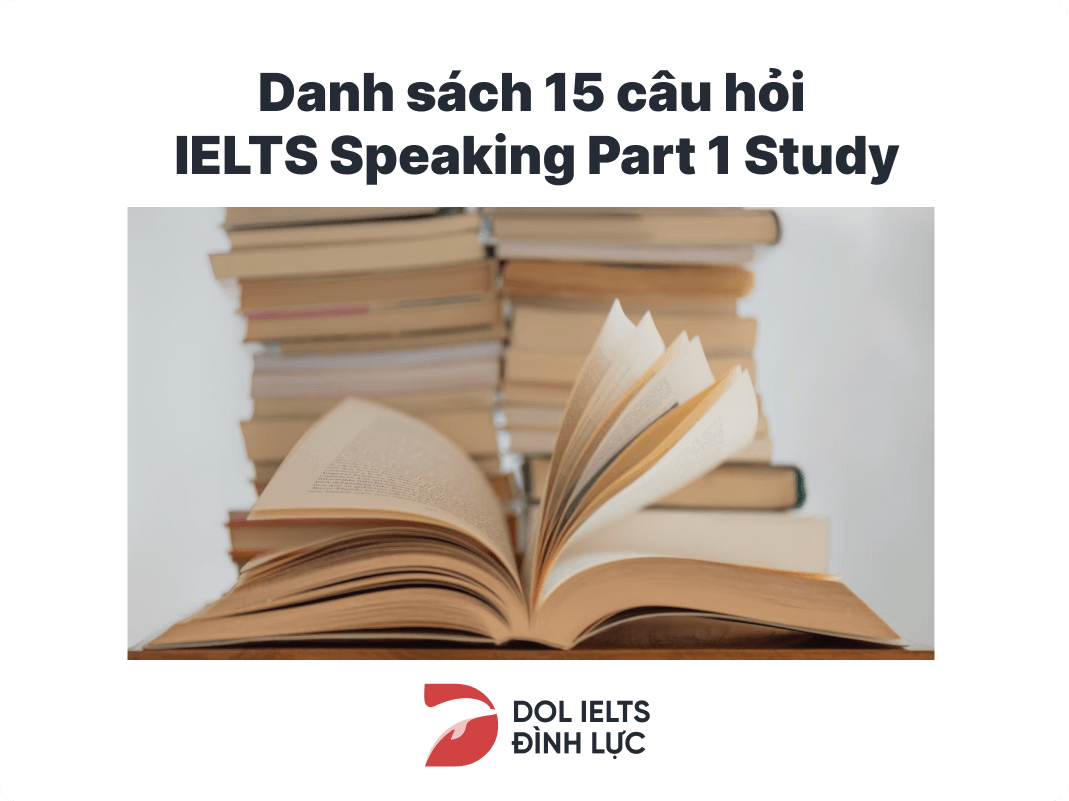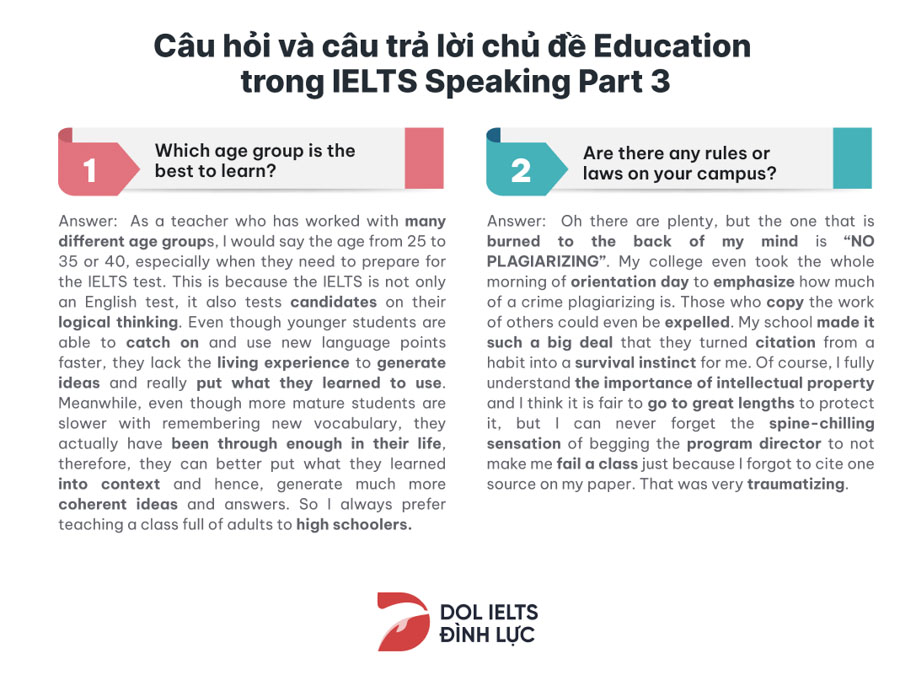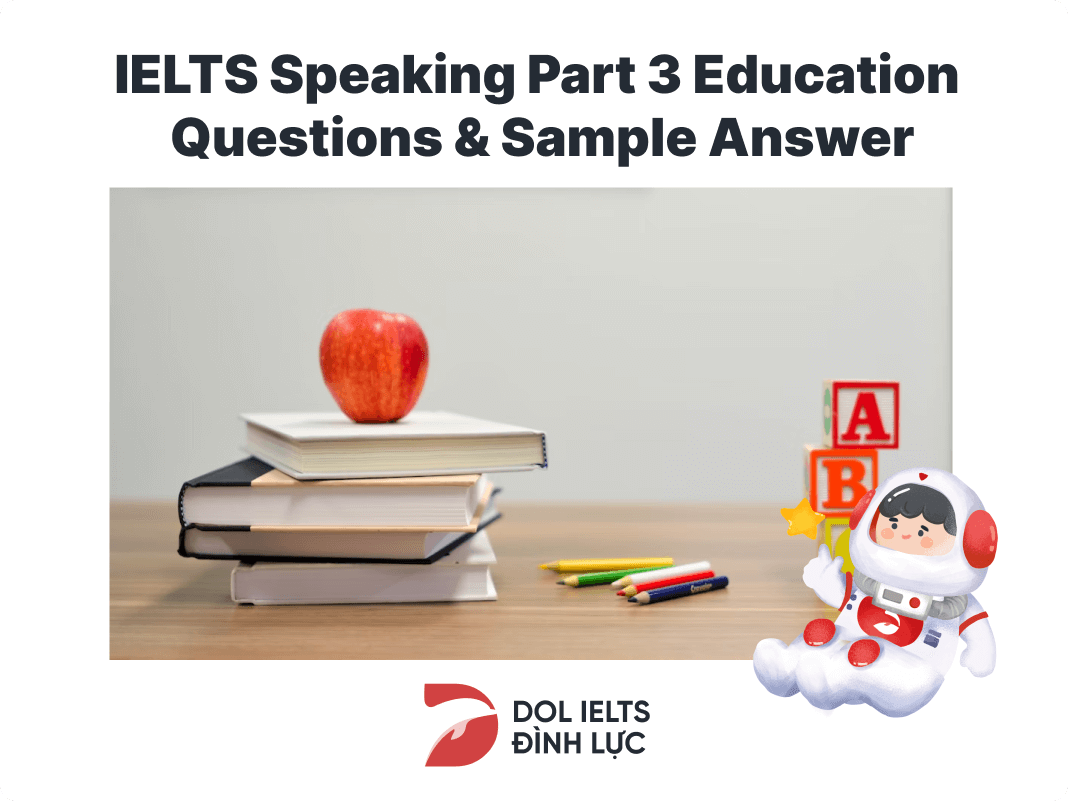IELTS Speaking Part 3 chủ đề Education: Câu hỏi, gợi ý & từ vựng
IELTS speaking part 3 education được rất đụng nếu flow câu hỏi từ speaking part 2 của bạn có hơi hướng nghiêng về education. Vì thế, DOL gửi đến bạn những câu trả lời mẫu cùng các từ vựng và cấu trúc câu hay ho để gây ấn tượng với giám khảo nha.
DOL IELTS Đình Lực
Dec 02, 2022
2 mins read

Table of content
Danh sách 15 câu hỏi IELTS Speaking Part 3 Study
Sample từng câu
1.
2.
3. D
4.
5.
6.
7.
8.
9.
10.
11.
12.
13.
14.
15.
Câu hỏi thường gặp:
Danh sách 15 câu hỏi IELTS Speaking Part 3 Study

Sau đây DOL sẽ liệt kê ra 15 câu hỏi về IELTS Speaking Part 3 Education. Một gợi ý nhỏ là bạn hãy cố gắng tự trả lời trước khi vào đọc sample để thu được nhiều giá trị nhất nhé.
What kind of things can young people learn from old people?
What kind of encouragement should parents give their children
Do you think teachers should be funny when they are teaching?
Why do teachers need to be kind to students?
Which one do you think is more important? Practical skills or academic skills?
Should students be allowed to use computers at school?
Which age group is the best to learn?
Are there any rules or laws on your campus?
What should teachers do to make students obey rules?
What should parents do to educate children about laws?
What subjects are helpful for children’s imagination?
How can people improve their memory?
Do you think children would like the rhythm of songs or poems? Why?
Do you think it is easier for children to learn a song or poem than adults? Why?
What can people learn from songs or poems?

Xem thêm: Hướng dẫn describe a coffee shop ielts sample answer
Sample từng câu
1. What kind of things can young people learn from old people?
I volunteered at a nursing home when I was in college, and all the old people there told me two things. First of all: Don’t take things too seriously. A lot of them told me they ended up there because they were very harsh on their friends, their children, even themselves. They wanted everything their way, so much that they shunned away people who couldn’t uphold that standard, and now they are here, alone. Another thing that a lot of them told me was to live to my heart’s content. Almost every single elder I talked to told me they have so many regrets. They regret that there are so many things they should have done but didn’t, sometimes because of a sense of responsibility towards their family, sometimes because of their ego. A grandma even told me that if young people are haunted by the “What ifs” only at night, then when they are old, it would haunt them at every waking moment. I don’t know about you, but I find that very educational and scary at the same time.
Vocab | Type | Meaning |
volunteered | verb | làm tình nguyện |
nursing home | noun | nhà dưỡng lão |
ended up | adjective | kết thúc |
harsh | adjective | hà khắc |
shunned away | verb | xua đuổi đi |
uphold that standard | verb | duy trì tiêu chuẩn đó |
live to my heart’s content | verb | Sống cho thỏa những mong ước của mình |
regrets | noun | những điều tiếc nuối |
a sense of responsibility | noun | cảm giác trách nhiệm |
ego | noun | cái tôi |
haunted | adjective | bị ám ảnh |
What Ifs | noun | Những cái “nếu như" trong cuộc sống |
every waking moment | preposition | mọi giây phút tỉnh giấc |
2. What kind of encouragement should parents give their children?
I personally think that parents should encourage their children to truly seek what they enjoy in life. Nowadays, when it comes to choosing hobbies, or even career paths, many parents kinda force their children into doing what they think is beneficial. Then the kid spends so much time and effort to keep up with all the expectations their parents have for them that they don’t have the chance to explore who they really are, and what they want to do in life, and that could really lead them to many problems, mostly mental when they become adults. So if parents truly want their children to be happy, guide them, and encourage them to live their best life, instead of trying to make them live the life that they want.
Vocab | Type | Meaning |
to seek | verb | tìm kiếm |
hobbies | noun | sở thích |
career paths | noun | con đường sự nghiệp |
force | verb | ép buộc |
beneficial | adjective | có lợi |
expectations | noun | những kỳ vọng |
explore who they really are | verb | khám phá bản thân mình |
mental | adjective | về mặt tâm lý |
live their best life | verb | sống cuộc sống tốt nhất của mình |
3. Do you think teachers should be funny when they are teaching?
Of course, particularly with dry and hard-to-digest subjects like Math or Science. In those subjects, students have to learn and remember rows and rows of formulas, equations, and theorems, and how tortuous it is if they have to study those things by staring at the board for hours on end, with their teachers going on and on like a shaman reciting incantations. Being funny not only invigorates the energy of the class but also helps students to remember what they learned easier since they can associate that knowledge to good memory in class, instead of that time they almost got bored to death in class.
Vocab | Type | Meaning |
dry and hard-to-digest | adjective | khô khan và khó tiếp thu |
formulas | noun | công thức |
equations | noun | phương trình |
theorems | noun | định luật |
tortuous | adjective | như tra tấn |
staring | verb | nhìn chằm chằm |
Shaman | noun | thầy đồng |
reciting incantations | verb | đọc bùa chú |
invigorates | verb | tiếp thêm sinh lực |
got bored to death | adjective | bị làm cho chán muốn chết |
4. Why do teachers need to be kind to students?
There are plenty of reasons for this but I think the most significant one is that, to some students, especially younger ones, teachers are the only positive parental figure that they could look up to. What I mean is that not every child comes from a good environment, and going to school is the only time of day when they can be around good influences. So if their teachers are mean and rude, it can really shape the way they grow up and their viewpoint towards the world, and most of the time not to good ends. Therefore, I always try my best to treat my students with respect and care, because you can never really know what someone is going through.
Vocab | Type | Meaning |
positive parental figure | noun | hình mẫu bố mẹ tích cực |
look up to | verb | noi theo |
be around good influences | verb | ở bên những ảnh hưởng tốt |
mean and rude | adjective | xấu tính và thô lỗ |
shape | verb | nhào nặn |
viewpoint | noun | góc nhìn, quan điểm |
not to good ends | adverb | không có kết cục tốt |
treat | verb | đối xử |
respect and care | noun | sự tôn trọng và quan tâm |
what someone is going through | noun | những điều mà ai đó đang trải qua |
5. Which one do you think is more important? Practical skills or academic skills?
In this day and age, I think those two kinds of skills are equally important. We are still living in a society that very much values degrees and certifications, so good academic skills open doors to better educational opportunities, and better job opportunities down the line. It is still hellish to get a good job without a college, or even a master’s degree, regardless of what people nowadays like to say. But then again, having good degrees to get you into places is one thing, having the practical skills and experience is what sets you above the rest. For example, a teacher is someone who knows how to impart knowledge, but a good teacher is someone who can actually spark the love of learning and trigger a sense of curiosity in their students, and that is something that comes from years of trials and errors, and not from any institutions.
Vocab | Type | Meaning |
equally important | adjective | quan trọng ngang nhau |
values | verb | trân trọng |
degrees and certifications | noun | bằng cấp và chứng chỉ |
academic skills | noun | kỹ năng học tập |
down the line | preposition | trong tương lai |
hellish | adjective | cực kỳ khắc nghiệt |
get you into places | verb | vào được các công ty |
practical skills | noun | kỹ năng thực tế |
sets you above the rest | verb | tách mình hơn khỏi số đông |
impart knowledge | verb | truyền đạt kiến thức |
spark the love of learning | verb | khơi dậy tình yêu học tập |
trigger the sense of curiosity | verb | kích hoạt sự tò mò |
trials and errors | noun | thử nghiệm và sai sót |
institutions | noun | học viện |
6. Should students be allowed to use computers at school?
Not at all, especially when students want to use their laptops or tablets to take notes. I personally think that it is something that is not suitable for every student. Even though it allows them to take notes very quickly, it does not help them to really absorb the lesson at all. Since they could note down whatever the teacher is saying as they are saying it, they just type things down absent-mindedly without really paying attention to what the important points are, so when they get home, they don’t really take the time to revise what they have learned because they are confident that they already have the entire lesson documented, and by the time finals come, they have these walls of text that they have to digest. Some try to learn it all by heart, some just give up. Of course, there are still many students who are disciplined and systematic enough with their studies to use laptops, but I don’t think that probability is something teachers should bet on.
Vocab | Type | Meaning |
take note | verb | ghi chép |
suitable | adjective | phù hợp |
absorb the lesson | verb | tiếp thu bài học |
absent-mindedly | adverb | một cách lơ đãng |
paying attention | verb | chú ý |
documented | adjective | được ghi chép lại trên văn bản |
wall of text | noun | “những bức tường chữ" → các văn bản chỉ toàn chữ |
digest | verb | tiêu hóa |
learn it all by heart | verb | học thuộc lòng hết |
give up | verb | bỏ cuộc |
disciplined and systematic | adjective | kỷ luật và có hệ thống |
probability | noun | xác suất |
bet on | verb | đánh cược vào |
7. Which age group is the best to learn?
As a teacher who has worked with many different age groups, I would say the age from 25 to 35 or 40, especially when they need to prepare for the IELTS test. This is because the IELTS is not only an English test, it also tests candidates on their logical thinking. Even though younger students are able to catch on and use new language points faster, they lack the living experience to generate ideas and really put what they learned to use. Meanwhile, even though more mature students are slower with remembering new vocabulary, they actually have been through enough in their life, therefore, they can better put what they learned into context and hence, generate much more coherent ideas and answers. So I always prefer teaching a class full of adults to high schoolers.
Vocab | Type | Meaning |
many different age groups | noun | nhiều nhóm độ tuổi khác nhau |
candidates | noun | thí sinh |
logical thinking | noun | khả năng tư duy logic |
catch on | verb | nắm bắt |
living experience | noun | kinh nghiệm sống |
generate ideas | verb | Nghĩ ra được ý |
put what they learned to use | verb | ứng dụng được những cái đã học |
been through enough in their life | verb | trải qua đủ nhiều trong cuộc sống |
put what they learned into context | verb | đưa những gì đã học được vào bối cảnh |
coherent ideas | noun | ý tưởng mạch lạc |
high schoolers | noun | học sinh trung học |
8. Are there any rules or laws on your campus?

Oh there are plenty, but the one that is burned to the back of my mind is “NO PLAGIARIZING”. My college even took the whole morning of orientation day to emphasize how much of a crime plagiarizing is. Those who copy the work of others could even be expelled. My school made it such a big deal that they turned citation from a habit into a survival instinct for me. Of course, I fully understand the importance of intellectual property and I think it is fair to go to great lengths to protect it, but I can never forget the spine-chilling sensation of begging the program director to not make me fail a class just because I forgot to cite one source on my paper. That was very traumatizing.
Vocab | Type | Meaning |
burned to the back of my mind | adjective | hằn sâu vào tiềm thức |
no plagiarizing | verb | không được đạo văn |
orientation day | noun | ngày định hướng sinh viên, thường sẽ là ngày đầu tiên của năm nhất |
emphasize | verb | nhấn mạnh |
copy | verb | sao chép |
expelled | adjective | bị đuổi học |
made it such a big deal | verb | biến nó thành chuyện lớn |
citation | noun | việc trích dẫn |
survival instinct | noun | bản năng sinh tồn |
the importance of intellectual property | noun | tầm quan trọng của tài sản trí tuệ |
to go to great lengths | verb | dùng những biện pháp mạnh |
the spine-chilling sensation | noun | cảm giác lạnh sóng lưng |
begging | verb | van xin |
program director | noun | giám đốc chương trình học thuật |
fail a class | verb | rớt một môn |
traumatizing | adjective | gây sang chấn tâm lý |
9. What should teachers do to make students obey rules?
I think the easiest way would be punishments, particularly when it comes to small children. Teachers nowadays have gotten too soft with their students and they seem to think that persuasion works better. But then children are still too simple-minded to be swayed by logic, they don’t care about all that, they want to do whatever makes them happy. And when teachers are unable to persuade them, there comes exceptions and leniency, and then those children become little brats and in the future, snobbish adults who think they could get away with things. Clear and unrelenting punishments teach children that their actions have consequences, and thus teach them to take responsibility for their actions. Of course, there is a fine line between disciplining and traumatizing them, but that’s another story.
Vocab | Type | Meaning |
punishments | noun | hình phạt |
gotten too soft | verb | trở nên quá mềm mỏng |
persuasion | noun | sự thuyết phục |
simple-minded | adjective | đầu óc đơn giản |
swayed by logic | adjective | bị thuyết phục bởi lý lẽ |
exceptions and leniency | noun | ngoại lệ và khoan dung |
little brats | noun | những đứa con nít ranh |
snobbish adults | noun | những người lớn hợm hĩnh |
Clear and unrelenting punishments | noun | Hình phạt rõ ràng và không nương nhẹ |
consequences | noun | hậu quả |
take responsibility | verb | chịu trách nhiệm |
fine line | noun | lằn ranh mỏng manh |
disciplining | verb | giáo huấn, đưa vào nề nếp |
traumatizing | verb | Gây sang chấn tâm lý |
10. What should parents do to educate children about laws?
I don’t know about how other families do it, but in my family, back when I was little, my mom always made me watch the daily news. After dinner, she would make the whole family gather to watch the news, and my parents would discuss every piece of news for me to hear. That really triggered my curiosity, so as they discussed, I would ask them why things are happening the way they are, and then my mom would explain it to me, giving related laws as she goes. I never thought much about it back then, but in hindsight, I think that activity really helped me to establish a general understanding of laws, and most importantly, some moral values.
Vocab | Type | Meaning |
watch the daily news | verb | xem tin tức hằng ngày |
gather | verb | tụ tập |
discuss | verb | thảo luận |
triggered my curiosity | verb | khơi dậy tính tò mò của tui |
in hindsight | conjunction | khi nhìn lại |
establish a general understanding of laws | verb | thiết lập hiểu biết cơ bản về luật |
moral values | noun | giá trị đạo đức |
Xem thêm: Tìm hiểu về ielts speaking education topic
11. What subjects are helpful for children’s imagination?
Contrary to belief, I think it’s not only social subjects like art or literature, but also scientific ones like biology or geography. This is because with children, their imagination is already vivid enough, so art can only provide them with a medium to express it. But by understanding how the world around them works, how it grows, how it fluctuates, it provides them with the fuel for their creativity to shine even brighter. For example, we have a bouquet of flowers. By learning art, students know how to use different colors and materials to portray said bouquet, but if they get to know more about what’s inside the branches, what tiny things make up a petal, they can even create worlds and galaxies in their mind, and I think that’s miles better than just a painting or a poem.
Vocab | Type | Meaning |
contrary to belief | conjunction | trái lại với quan niệm phổ biến |
vivid | adjective | sống động |
a medium to express it | noun | một hình thức để diễn đạt nó ra |
fluctuates | verb | biến chuyển |
fuel | noun | nhiên liệu |
a bouquet of flowers | noun | một bó hoa |
portray | verb | khắc họa |
branches | noun | cành cây |
petal | noun | cánh hoa |
miles better | adjective | tốt hơn rất nhiều |
poem | noun | bài thơ |
12. How can people improve their memory?
I have a horrible memory myself, so one habit I picked up is that you should always try to make lists and agendas. From what I have been through, the more you try to remember, the more likely you are going to forget it. So every morning before going out I would write down a list of to-do things for the day, and with every task, a few lines of descriptions. Although it doesn’t immensely improve my memory, it sorta sticks a metaphorical post-it note in the back of my mind, and once I finish a task, I am already mentally prepared for the next. Another add-on benefit of this is that it helps me to be more organized too. And by being more organized and systematic, I found that it improved my memory more than those memory-improving games on the internet.
Vocab | Type | Meaning |
a horrible memory | noun | Một trí nhớ tệ |
lists and agendas | noun | danh sách và lịch trình |
descriptions | noun | mô tả |
immensely | adverb | một cách lớn lao |
sticks | verb | dán dính |
metaphorical post-it note | noun | một tờ ghi chú theo nghĩa bóng |
in the back of my mind | preposition | trong tiềm thức |
organized and systematic | adjective | có tổ chức và có hệ thống |
13. Do you think children would like the rhythm of songs or poems? Why?
I think children don’t just like melodies and rhythms, they subconsciously love it. That’s why you can see most of the basic lessons for young children are always in the form of jingles and nursery rhymes. For example, the ABC song helps them to learn the alphabet and its order, while Old McDonald Had A Farm helped them to be familiar with typical animals and the sound they make. I think this is because melodies and the way words in songs and poems rhyme with each other just make words become fun, and children love fun don’t they?
Vocab | Type | Meaning |
melodies and rhythms | noun | giai điệu và nhịp điệu |
subconsciously | adverb | trong tiềm thức |
jingles and nursery rhymes | noun | ca khúc ngắn và những bài đồng dao |
order | noun | trật tự |
familiar | adjective | thân quen |
typical animals | noun | những con vật thông thường |
the sound they make | noun | âm thanh mà tụi nó phát ra |
rhyme | verb | có vần |
14. Do you think it is easier for children to learn a song or poem than adults? Why?
Nope, I don’t think so at all. I think when it comes to learning a song, how quickly you learn and remember it depends on how much you relate to the lyrics. For example, my little brother and cousins would pick up nonsense pop songs, and even silly commercial ad-libsjingles very quickly, while I have also seen my mom fully memorize the lyrics and even the to the latest ballad by her fave diva in just a morning. So I think nowadays older people find it hard to learn new songs because of the lyrical content and not because of their age.
Vocab | Type | Meaning |
relate | verb | đồng cảm |
lyrics | noun | lời bài hát |
pick up | verb | nhớ được |
nonsense pop songs | noun | những bài nhạc pop vô nghĩa |
silly commercial jingles | noun | những bài hát quảng cáo nhảm nhí |
fully memorize | verb | ghi nhớ toàn bộ |
ad libs | noun | những âm tiết thêm thắt xen giữa các câu trong bài hát |
Fave | adjective | viết tắt cho Favorite - Ưa thích |
lyrical content | noun | nội dung lời bài hát |
15. What can people learn from songs or poems?
I don’t know about others but I think it would be how to express their emotions. A lot of people find it difficult to understand the feelings that they are having, or even to acknowledge them at all. Meanwhile, songs and poems not only portray but also dive deep into an extremely wide range of different emotions, from basic ones like happy, and sad, to even very specific ones, like the sensation of standing still on the beach, letting the waves wash over your feet or even the feeling of being lost and disoriented when you are in your mid-20s. It’s not only nice to be able to finally put such emotions into words, but it is also nice to know that you are not alone in this.
Vocab | Type | Meaning |
express their emotions | verb | thể hiện cảm xúc của mình |
acknowledge | verb | công nhận |
portray | verb | khắc họa |
dive deep | verb | đi sâu vào |
an extremely wide range of different emotions | noun | một loạt các cảm xúc khác nhau |
basic | adjective | cơ bản |
sensation | noun | xúc cảm |
standing still | verb | đứng yên |
wash over | verb | rửa qua |
lost and disoriented | adjective | lạc lối và mất phương hướng |
put such emotions into words | verb | biến cảm xúc thành lời |
📖 DOL xin gửi bạn một vài chủ đề tham khảo khác:
Câu hỏi thường gặp:
Những câu hỏi thường gặp về chủ đề giáo dục trong IELTS Speaking Part 3?
Do you work or are you a student? (Bạn đang đi làm hay bạn là sinh viên?)
Why did you choose that subject? (Tại sao bạn lại chọn môn học đó?)
Do you enjoy studying at school? (Bạn có thích học ở trường không?)
Do you study English now? (Bây giờ bạn có học tiếng Anh không?)
What kind of school did you go to as a child? (Bạn đã học trường gì khi còn nhỏ?)
Where did you study? (Bạn đã học ở đâu?)
What did you study in university? (Bạn đã học ở trường đại học nào?)
Gợi ý trả lời câu hỏi: Why is education important?
Có thể trả lời rằng: A country becomes technologically advanced because of educated people. Not only this, but also by giving importance to education, the nations can get rid of problems like, poverty, unemployment and population growth that delay the progress of a nation. The crime rate can also be kept under. (Một đất nước trở nên tiên tiến về mặt công nghệ là nhờ những người có học. Không chỉ như vậy, mà còn bằng cách coi trọng giáo dục, các quốc gia có thể thoát khỏi những vấn đề như đói nghèo, thất nghiệp và gia tăng dân số làm trì trệ sự tiến bộ của một quốc gia. Tỷ lệ tội phạm cũng có thể được giữ ở mức thấp).
Gợi ý trả lời câu hỏi: What makes someone a good student?
Thí sinh có thể trả lời như sau: A good student is the one who can work in a group, motivate others and yield productive output. Being positive, helpful, cooperative and friendly are all the traits of a good student. (Học sinh giỏi là học sinh có thể làm việc nhóm, thúc đẩy người khác và mang lại kết quả công việc hiệu quả. Tích cực, hữu ích, hợp tác và thân thiện là tất cả những đặc điểm của một học sinh giỏi.)
Gợi ý trả lời câu hỏi: What are 3 types of education?
Primary education (Giáo dục tiểu học)
Junior education (Giáo dục cơ sở)
Intermediate education (Trình độ trung cấp)
Giám khảo sẽ trao đổi nhiều hơn với bạn trong phần này và có thể yêu cầu bạn giải thích ý kiến của mình để xem bạn có khả năng truyền đạt những ý tưởng trừu tượng tốt như thế nào so với các chủ đề cá nhân mà bạn đã nói trong Phần 1 và 2.
https://ielts.com.au/australia/prepare/article-question-types-ielts-speaking
DOL hy vọng là bài viết trên đã giúp bạn biết nhiều hơn về IELTS speaking part 3 chủ đề education để có thể áp dụng tự học hiệu quả.
Nếu có bất kỳ thắc mắc gì về IELTS Speaking hay các kỹ năng, đừng ngần ngại mà liên hệ DOL qua các kênh sau bạn nhé: website, Facebook.
Chúc bạn thành công.
Table of content
Danh sách 15 câu hỏi IELTS Speaking Part 3 Study
Sample từng câu
1.
2.
3. D
4.
5.
6.
7.
8.
9.
10.
11.
12.
13.
14.
15.
Câu hỏi thường gặp:

